Developmental milestones for an 18-month-old baby
Here’s your checklist for the expected behaviours of your toddler

As joyful as it is to see the softly pattering feet of your 18-month-old stumbling around home, with progressing into toddlerhood, also comes the dreaded tantrums. However, this is part of a normal and healthy child development as you will see in the checklist for developmental milestones for your curious toddler, in an interview with Dr Afra Jamal Ahli, Specialist in Family Medicine and Fellow in Maternal and Child Health at Dubai Health Authority.
Some examples are ‘sit here’, ‘sit down’, ‘stand up’ – start to develop at 12 months but are fully matured at 18 months

Social and emotional development milestones for an 18 month old
1. Throwing tantrums
Tantrums begin at around this age till up to about 4 years. Some continue with the behaviour and others abandon it.
Dr Afra says, “It all depends how parents are treating the child. Temper tantrums can occur at any age, and the child might be aggressive, shouting or crying – some of them might also hold their breath – but that is totally normal.” Family medicine or psychology consultations can help alleviate symptoms and manage the situation.
For more information on child tantrums and how to stop them, read our article here.
2. Showing affection to familiar people
Friends and family become more defined in your baby’s mind and they start to show affection by clinging to you, and smiling and playing with you.
3. Playing pretend
Whether it’s feeding a doll, simulating cooking or racing cars, pretend play is an integral part of child development.
“This is very important because at 18 months, we do the questionnaire for autism (M-chat or Modified Checklist for Autism in Toddlers) that is one of the questions that we ask – does your child play pretend, like for example, holding a phone, trying to talk to someone who is not there or not,” says Dr Afra.
4. Pointing to draw attention
At this age, babies begin pointing to show something interesting,“For example, children feel so happy when they see a plane crossing in the sky. At this age, they are expected to directly point to it and say there is a plane,” says Dr Afra.
If your child doesn’t point to anything at this age, this should be a concern and be assessed, she adds.
Language and communication milestones for an 18-month-old
1. Saying 20 to 30 clear words
Babbling should clarify into words at this stage, although the beginnings and endings of words may not always be present. (Fancy some banana “miww” anyone?). “They should be saying around 20 words, but if it is less than 6 clear words, this is an alarm,” says Dr Afra.
2. Showing clearly whether they want something or not
They should be able to point to show something he/she wants and shake their head or saying it to express ‘no’.
Cognitive (skills) milestones for an 18 month old
1. Knowing ordinary objects
Being able to identify simple objects such as phone, table should come easily to your baby at this stage.
2. Following commands without gestures
Dr Afra says, “Some examples are ‘sit here’, ‘sit down’, ‘stand up’ – start to develop at 12 months but are fully matured at 18 months.”
3. Scribbling
Peril awaits your clean painted walls as your baby is expected to begin scribbling at this age. According to Ireland’s National Childcare Directory, scribbling plays a crucial part in developing creative, literacy and coordination skills. There are five stages to it that manifest in coming years – uncontrolled scribbling, controlled scribbling while they are trying to make shapes, naming of scribbling, early representational attempts and finally, a representational stage that progresses into drawing.
4. Pointing to get attention
At this age, your baby will know that pointing in a certain direction can draw attention.
5. Pointing to one body part
Being taught about body parts, your child should be able to point at them when they are named. Physical development milestones for an 18 month old
6. Walking without support
At this age, babies are expected to be walking fully without support. They may walk up steps and also start to run. If this hasn’t happened, visit your paediatrician to discuss further.
7. Pulling toys while walking
If you are a parent of yet another Baby-shark fanatic, chances are you’ve bought shark plushies to comfort your toddler. Buy specific pull toys, or encourage them to pull their toys as this helps them understand the mechanism of pulling, a step forward for physical learning.
8. Can help undress herself/himself
With improved motor skills, toddlers begin to help with dressing themselves.
9. Drinking from a cup without help and eating with a spoon
With strength developing in your baby’s fingers, holding instruments become possible.
At 18 months, the international M-CHAT or Modified Checklist for Autism in Toddlers screening test is also administered.
How can I support my child to help reach these milestones?
According to the United States Centers for Disease Control, activities such as using simple words to regularly converse with your child, describing their own emotions, reading books, and encouraging pretend play and empathetic interaction can be beneficial for child development.
Providing toys, books and balls as well as space for walking and playing are also good ways for your little one to develop their motor and cognitive skills.
- The writer is an intern with Gulf News
Sign up for the Daily Briefing
Get the latest news and updates straight to your inbox



